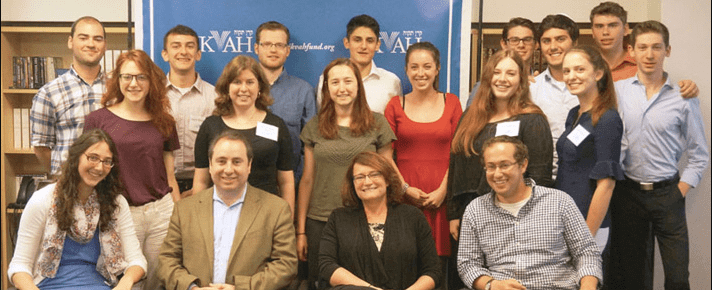Welcome to Tikvah Connects, a new publication of the National Ramah Commission, connecting you several times a year with news about members of the Tikvah community and exciting Tikvah events.
Nearly every Rosh Hashanah and Passover since 1984, I have received beautiful handwritten cards from Matthew, a former Tikvah camper. Several Friday afternoons and erev chags a year, I receive lovely phone calls from Jeremy, another former camper from Camp Ramah in New England. Matthew, Jeremy, and hundreds of other former Tikvah campers from across the United States and Canada have grown in so many ways since their camp years.
Members of the larger Tikvah community are quite diverse. They work part time, full time, and volunteer. They live in apartments, group residences, and houses. They participate in various social and recreational activities. Yet, they all have one thing in common: They cherish precious memories of summers in various Tikvah programs. They feel deeply connected to Tikvah and Ramah, and many are looking for ways to stay connected.
Tikvah is truly special! There has been so much growth in the world of inclusive camping since Herb and Barbara Greenberg started the first Tikvah program (with 8 campers!) in Glen Spey, NY, in 1970. The Tikvah program soon moved to Ramah New England. Now, all of our Ramah camps include campers with disabilities. Each time I travel to Israel, I am fortunate to visit with the Greenbergs in their home in Ra’anana. They are delighted when I share stories of Tikvah’s ongoing development. So much has happened in 47 years!
Our Tikvah programs offer camping, vocational training, employment opportunities, family camps, Israel trips and more!
Our National Ramah Tikvah Network, founded in 2011, connects Ramah staff, families, and alumni from across camps and from across the decades. Our alumni staff, campers, and families live in many parts of the US, Canada, Israel, and even other countries around the world. We have had successful local reunions in such places as Washington, DC, Chicago, Los Angeles, and at Camp Ramah in Ojai, California. Some of our camps hold weekly or regular video chats with such names as “Shabbos Is Calling” and “Shavua Tov.”
We are particularly excited to share our inaugural issue of Tikvah Connects at this time. Just this week, Tikvah staff members for summer 2017 met for training at the National Ramah Spring Leadership Training Conference (“Winer”) at Ramah New England. And earlier this month, 101 representatives of our Ramah camps participated in our 4th Ramah Israel Bike Ride and Hiking Trip and have thus far raised almost $470,000 to support our Ramah Tikvah programs.Three of our Tikvah Directors (Ralph Schwartz, Wisconsin; Orlee Krass, Poconos; and Howard Blas, Northern California/NRC) were riders! There’s still time to support this important cause.
Enjoy this inaugural issue of Tikvah Connects. In each issue, we will share news of staff, alumni, and programs. Feel free to send ideas, feedback, and updates to me at howard@campramah.org or (413) 374-7210.




